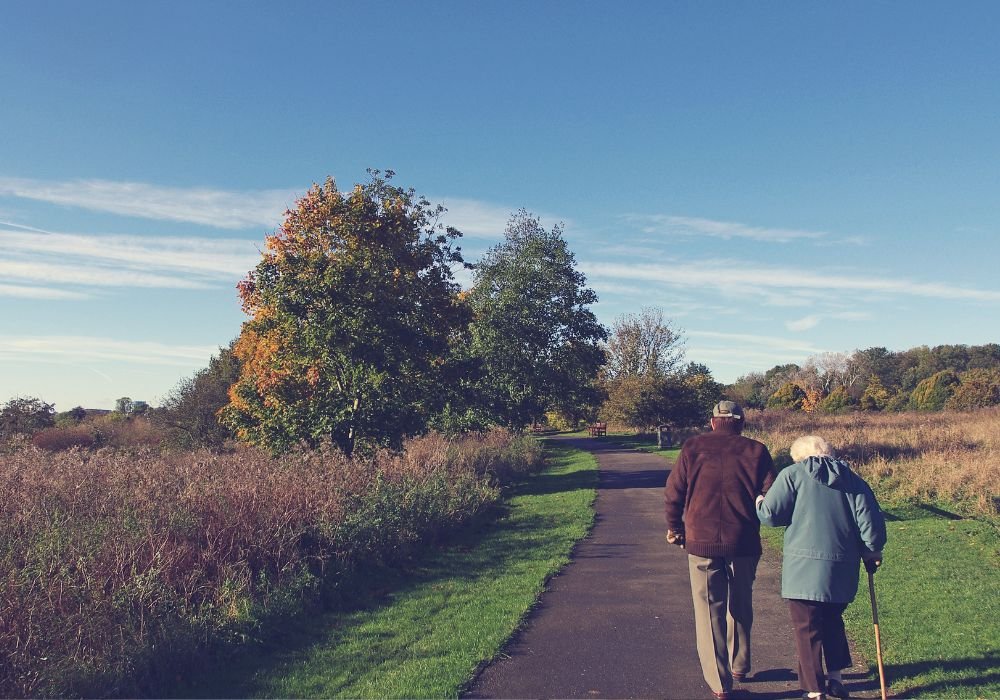How to Create Meaning and Purpose in Your Retirement Years: A Complete Guide to Fulfilling Living

Last Updated on May 29, 2025 by George
Are you ready to transform your retirement into the most fulfilling chapter of your life? Stepping away from your career doesn’t mean stepping away from purpose—it means discovering new ones that align with who you are today. Recent research shows that while retirement confidence has stabilized, many new retirees still struggle with finding direction in their post-work years. The good news? This challenge is both common and completely solvable.
This comprehensive guide explores five powerful strategies to help you uncover deep meaning and satisfaction in your retirement years. You’ll discover how self-reflection can reconnect you with your authentic passions, learn to engage in activities that energize rather than simply occupy your time, and explore ways to build meaningful connections that enrich both your life and your community.
We’ll also delve into the profound benefits of lifelong learning—whether that’s mastering a new skill, exploring creative outlets, or staying current with the world around you. Finally, you’ll learn how prioritizing your physical health and well-being creates the foundation for everything else you want to accomplish.
The beauty of retirement lies in its flexibility. Unlike your working years, you now have the freedom to design a life that truly reflects your values, interests, and dreams. Whether you’re looking to volunteer for causes close to your heart, pursue hobbies you never had time for, or explore entirely new adventures, this guide will help you create a retirement that’s not just comfortable, but truly meaningful.
Ready to discover what makes this stage of life so exciting? Let’s explore how to find purpose in retirement together.

How to Find Purpose in Retirement
Retirement represents one of life’s most significant transitions—a time filled with both exciting possibilities and unique challenges. While the freedom from work obligations can feel liberating, many people entering retirement find themselves searching for fresh meaning and direction in their daily lives. This search is entirely natural and more common than you might think.
Recent studies, including BlackRock’s 2024 retirement survey, reveal that retirement experiences are deeply personal, yet many of the challenges people face are surprisingly universal. Research indicates that mental health issues occur relatively infrequently post-retirement but physical health problems are relatively common, although often associated with ageing rather than retirement per se.
The benefits of intentional retirement planning extend far beyond financial security. Retirement planning fulfillment was positively associated with social activity, self-esteem, and positive mental health. Engaging in meaningful activities can lead to improved health outcomes, reduced isolation, and enhanced physical capabilities. We’ve created this comprehensive guide to help you understand how to build purpose in your retirement years.
Self-Reflection and Personal Growth
Retirement offers an extraordinary opportunity to reconnect with your authentic self—something that may have been challenging during your busy working years. This journey begins with intentional self-reflection and a commitment to personal growth.
Connect with Your Authentic Self
Take time to explore what genuinely matters to you now. What are your core values? Which activities or interests bring you genuine joy? Perhaps you’ve always been drawn to gardening but never had the time, or you’ve dreamed of learning photography. Writing down your thoughts can help clarify your goals and provide clear direction.
Consider starting a daily journaling practice or trying meditation to explore your thoughts more deeply. These practices can uncover forgotten aspirations or rekindle interests you set aside during your career-focused years. Through this process, you’re not just filling your days—you’re discovering authentic ways to create meaning in your retirement.
Recognize and Share Your Unique Gifts
Everyone possesses unique talents and strengths that can benefit others. Maybe you have exceptional listening skills, a gift for organizing, or a creative flair that others would love to learn from. Think about how you can apply these abilities in ways that bring personal fulfillment.
Consider mentoring younger professionals in your former field, teaching a class at your community center, or volunteering with local organizations. Sharing your knowledge and experiences not only helps others but also strengthens your sense of connection and value within your community.
Explore Opportunities for Personal Growth
Retirement isn’t about winding down—it’s about growing in new directions you couldn’t explore during your working years. Set personal goals that both challenge and excite you. Whether that’s learning Spanish, mastering watercolor painting, or training for a walking marathon, these goals provide structure and achievement.
Personal growth keeps your mind sharp and builds confidence. Look into online courses, local workshops, or community college classes to expand your horizons. You’ll meet new people, gain fresh perspectives, and discover additional pathways to meaningful living.

The Journey to Meaningful Living
Self-reflection and personal growth are powerful tools to navigate the transition into retirement. They help you reconnect with your values, uncover hidden talents, and develop new skills that can enrich your life. By investing in yourself, you’ll create a fulfilling retirement that aligns with your passions and dreams.
Remember, finding purpose in retirement doesn’t happen overnight. It’s a journey of exploration, learning, and connection. Start by looking inward, embracing growth, and sharing your gifts with others. Through these efforts, you’ll build a life filled with meaning and joy.
Engage in Meaningful Activities
Retirement is a special chance to commit yourself to pursuits that bring delight and contentment. Investigating interests, creating goals, and attempting new activities will help you design a daily schedule with direction. One of the most fulfilling approaches to discover a purpose in retirement is participating in important events.
Pursue Hobbies and Passions
Focus on activities you enjoy or have always wanted to explore. Whether your interests lie in gardening, painting, woodworking, or cooking, now is the time to dive in. Hobbies provide entertainment while keeping you active and mentally engaged.
Gardening, for example, connects you with nature and provides physical activity, while painting offers a wonderful outlet for self-expression. Joining groups or taking classes related to your hobbies also helps you meet like-minded people, expanding your social connections during retirement.
Set Personal Goals
Setting goals is a great instrument for personal growth even in retirement; it is not only for your profession. Start by noting both long-term and short-term objectives that appeal to and challenge you. Learning to write a memoir or pick an instrument, for instance, might make one feel successful.
Reaching these objectives gives your days organization and helps you to feel motivated. Working toward something significant will help you realize how interesting new activities may be in providing direction in retirement.
Volunteer Your Time
Volunteering is a fulfilling way to give back to your community while staying active and engaged. Identify causes or organizations that align with your values, such as animal shelters, schools, or food banks. Contributing your time and skills not only helps others but also gives you a sense of connection and satisfaction.
Consider sharing your professional expertise by mentoring or tutoring. Volunteering creates a ripple effect—you inspire others while finding deeper meaning in your own life.
Explore Lifelong Learning
Engaging in lifelong learning keeps your mind sharp and opens doors to new passions. Take courses at a local community center or online in subjects you’ve always been curious about. Whether it’s history, art, or technology, learning something new can reignite your excitement for life.
These educational pursuits are also great ways to connect with others who share similar interests. The process of learning and growing adds structure to your days and reinforces your sense of purpose.
By pursuing meaningful activities, you can shape a retirement that is vibrant and rewarding. Whether you’re nurturing a lifelong passion or discovering something entirely new, these experiences enrich your life and provide direction.
Retirement is the perfect time to explore what makes you happy and to invest in what truly matters. By engaging in meaningful activities, you’ll uncover new ways to stay active and find a purpose in retirement that resonates deeply with your values and aspirations.
Social Connections and Community Involvement
Retirement is a great opportunity to create and deepen relationships—old and new. Maintaining emotional and mental health requires social contacts and community involvement. By means of these relationships, you can not only improve your quality of life but also discover meaning in retirement by helping to contribute to something more than yourself.
Stay Socially Engaged
Retirement might present difficulties for isolation, hence it’s important to keep active in society. Regularly interacting with friends, relatives, and neighbors helps you fight loneliness and maintains your emotional balance. Your days can be structured and joyful with simple events as weekly coffee meetings, gaming evenings, or local book club membership.
Another approach to meet others with your interests is by combining social clubs or organizations catered to seniors. From travel organizations to hobby-based clubs, these events provide chances to meet like-minded people and build enduring friendships. These relationships not only brighten your life but also provide direction for your retirement.
Volunteer in Your Community
One of the most rewarding ways to remain in touch and pay back your community is by volunteering. Volunteering lets you change things while interacting with others, whether it means mentoring children, supporting nearby food banks, or helping with environmental clean-up projects.
Think about reasons that speak to your values and hobbies. If you enjoy animals, for instance, helping at a shelter might be rather fulfilling. By means of these endeavors, you will find gratification in helping to create something significant and so developing your feeling of purpose.
Join a Faith or Spiritual Community
For many retirees, faith or spirituality can provide a profound sense of purpose and connection. Joining a church, temple, or meditation group can be a powerful way to foster relationships while aligning with your personal beliefs.
These communities often host events, social gatherings, and volunteer opportunities, giving you multiple ways to stay engaged. The supportive environment of a spiritual community can help you navigate the emotional shifts of retirement and offer guidance in finding purpose.

Explore Intergenerational Connections
Developing interactions between several age groups might provide fresh ideas and a vigor for your life. Think about mentoring next generations, helping with school projects, or lending your time to young-oriented projects. Not only will sharing your knowledge and experience enhance your own life but it will also help others.
Intergenerational relationships can offer novel ideas and chances for personal development by means of others. Many times, these meetings result in a greater respect of life and a fresh relevance in your neighborhood.
Build a Network of Support
Along with helping you feel valuable and involved, social contacts and community service assist you avoid loneliness. They remind you that you are part of a greater network and help to contribute something significant. Developing relationships and returning the favors to others will help you to find meaning in retirement and lead to a happy existence.
Retirement marks the beginning of a new chapter, not the conclusion of your road. Participating in social events and supporting your neighborhood guarantees that this phase is active and fulfilling, enabling you to live every day with intention and goal.
Continuous Learning and Development
Retirement offers an interesting period to widen your horizons, develop, and discover. Personal growth and lifelong learning help to keep your intellect sharp and your days full of meaningful events. Accepting this stage as a chance to pick up new abilities and pursue new hobbies can help you to establish a satisfying schedule and give direction in retirement.
Embrace Lifelong Learning
Among the best strategies to remain psychologically active and involved is lifelong learning. Retirement provides the freedom to explore interests and talents you might not have had time for during your employment years. Think about signing up for local seminars, online courses, or perhaps community college classes.
Learning something new excites and rewards you whether it’s technology, cooking, or history. Many retirees discover that by relating their hobbies with their sense of curiosity, lifelong learning reignites their passion and provides direction in retirement.
Explore Creative Outlets
One very effective means of self-expression and development is creativity. Retirement allows you the time and flexibility to pursue artistic interests as painting, writing, or handcraft. These pursuits not only bring fun but also work as means of emotional wellness and stress release.
Beginning a diary or a memoir, for instance, lets you examine your life and share your insights with others. Likewise, attempting photography or pottery can reveal skills you never realized you possessed. Your routine gains complexity and excitement from creativity, which also motivates and makes you feel successful.
Develop New Skills
Retirement is an excellent time to develop practical or professional skills. Perhaps you’ve always wanted to learn a new language, play an instrument, or master a particular software program. These challenges keep your mind active and give you goals to work toward.
Local libraries, senior centers, and online platforms like Udemy and Coursera offer countless resources to help you get started. By learning new skills, you’ll discover new passions and opportunities to connect with others who share your interests. This journey often leads to a deeper understanding of how to find purpose in retirement.
Stay Updated and Relevant
The world is changing all the time, hence keeping updated will help you to make your retirement richer. Maintaining current events, technology, or industry trends enables you to remain relevant and connected in the hectic environment of today.
To have provocative dialogues, think about visiting lectures or joining discussion groups. Maintaining knowledge also helps you to actively engage in your community, whether it means guiding others or offering significant knowledge contributions.
Grow Through Challenges
Personal development is about overcoming obstacles and developing emotionally as much as it is about learning abilities. Though retirement can present unanticipated challenges, confronting them head-on will help you become more robust. Every difficulty—regulating new routines or adjusting to a slower pace—is a chance for improvement.
Living a happy life in retirement depends on ongoing education and development. Embracing fresh chances to learn, create, and develop can help you to deepen your daily experiences and find new interests. These activities not only keep your mind busy but also enable you to discover meaning in retirement, therefore transforming this stage of life into a very fulfilling and significant one.

Physical Health and Well-being
Maintaining physical health and well-being is a cornerstone of a fulfilling retirement. Staying active, adopting healthy habits, and prioritizing self-care can help you enjoy this phase of life to its fullest. By focusing on your physical health, you can boost your energy, enhance your mental clarity, and find purpose in retirement through activities that nurture both your body and mind.
Stay Active
Regular physical activity is essential for maintaining strength, flexibility, and overall health in retirement. Whether it’s walking, swimming, yoga, or gardening, find an activity you enjoy and make it a part of your daily routine. Exercise not only benefits your body but also releases endorphins that improve mood and reduce stress.
Group fitness classes or sports leagues are also great ways to stay active while connecting with others. Activities like tai chi or Pilates offer low-impact options that promote balance and reduce the risk of injury. By staying active, you’ll not only improve your physical health but also create opportunities to engage socially and discover new ways to find purpose in retirement.
Focus on Nutrition
A balanced diet is critical to feeling your best in retirement. Prioritize fresh fruits, vegetables, lean proteins, whole grains, and healthy fats to maintain energy and support overall wellness. Avoid processed foods and excessive sugar, which can lead to fatigue and long-term health issues.
Consider experimenting with cooking new recipes or joining a cooking class. Preparing healthy meals can be an enjoyable hobby that supports your well-being while expanding your culinary skills. Proper nutrition is a foundational step toward leading an active and fulfilling retirement.
Prioritize Preventative Care
Preventative healthcare is key to catching potential issues early and maintaining long-term health. Schedule regular check-ups with your doctor, dentist, and optometrist to ensure you’re staying on top of your health needs. Screenings, vaccinations, and discussions about lifestyle adjustments can all contribute to a healthier retirement.
Staying proactive about your health allows you to engage fully in activities that bring meaning and joy. With a clear focus on well-being, you’ll have the energy and strength to explore new passions and continue growing.
Practice Mindfulness and Stress Management
Physical health is rather closely related to emotional well-being. Though retirement might occasionally provide unanticipated difficulties, mindfulness techniques include yoga, deep breathing, or meditation can help you remain grounded and control stress.
Mindfulness can be as basic as spending a few minutes every day to concentrate on your breathing or to consider what you are thankful for—it is not complicated. These techniques support your keeping a good attitude and emotional balance.
Rest and Recovery
Particularly in retirement, sleep is absolutely vital for general health. Try to get 7–8 hours of quality sleep every night so that your body and mind may heal and revitalize themselves.
Develop a regular nighttime schedule, cut screen time before bed, and design a peaceful sleeping space.
Good rest guarantees you the energy to participate in activities that bring fulfillment in addition to supporting physical health.
Cultivate a Healthy Lifestyle
Retirement provides the ideal opportunity to make investments in your physical well-being. Enjoying this period of life to the best depends on keeping active, eating healthy, and controlling stress. By enabling you to engage in activities that fit your passions and aspirations, these behaviors not only improve your daily experiences but also help you find meaning in retirement.
Giving your health top priority will lay a strong basis for a happy, fulfilling, and colorful retirement.
Conclusion
Retirement represents a time to rediscover yourself and embrace the freedom to shape a truly fulfilling life. By staying active, engaging in meaningful activities, and nurturing your relationships, you can create a sense of balance and joy that transforms these years into your most rewarding yet.
Prioritizing your physical health, emotional well-being, and personal growth will guide you toward a more satisfying experience. Through these efforts, you’ll discover how to create purpose in retirement and build a life rich with meaning and satisfaction.
Remember, finding purpose in retirement isn’t something that happens overnight—it’s an ongoing journey of exploration, learning, and connection. Start by looking inward, embracing growth opportunities, and sharing your unique gifts with others. Through these intentional efforts, you’ll build a life filled with meaning, joy, and deep satisfaction.
What activities bring you the most joy and fulfillment in your daily life? Are you ready to explore new ways to find meaning in your retirement years? Share your thoughts and experiences in the comments below—we’d love to hear about your journey toward purposeful living!
References
- BlackRock. (2024). Read on Retirement Survey. Retrieved from https://www.blackrock.com/us/individual/insights/retirement/2023-read-on-retirement-survey
- Employee Benefit Research Institute. (2024). Retirement Confidence Survey. Retrieved from https://www.ebri.org/retirement/retirement-confidence-survey
- British Psychological Society. (2024, January 22). Retirement, health and wellbeing. The Psychologist. Retrieved from https://www.bps.org.uk/psychologist/retirement-health-and-wellbeing
- Current Psychology. (2023). How older adults fulfill their retirement plans relates to positive mental health: a path model analysis of social activity and self-esteem. Retrieved from https://link.springer.com/article/10.1007/s12144-023-04735-6
- Emerald Insight. (2024). Social influences on the psychological well-being of elderly individuals. Retrieved from https://www.emerald.com/insight/content/doi/10.1108/jhass-01-2024-0010/full/html





